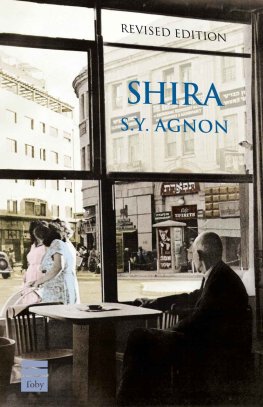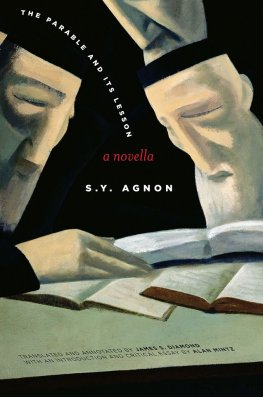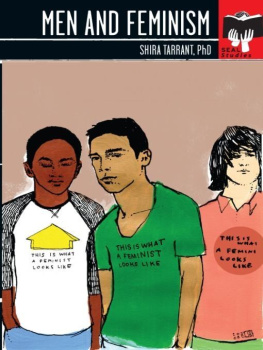It was almost twilight when Manfred Herbst brought his wife to the hospital. After a few minutes, footsteps were heard, and Axelrod, the clerk, arrived, talking over his shoulder to an aide, to the aides wife, to both of them at once. As he walked and talked, he shifted his glasses from his eyes to his forehead and looked around in alarm, as if he had come into his house and found a stranger there. He asked what he asked, said what he said, took out a notebook, put his glasses back in place, and wrote what he wrote. Finally, he brought Mrs. Herbst to the room where women in labor wait to be assigned their beds. Manfred dragged along behind his wife, then came and sat with her.
Manfred sat at Henriettas side with the other women about to give birth, thinking about her and her pregnancy, which had come upon them not by design for, being past midlife, she was, presumably, beyond such concerns. How would she withstand the anguish of birth and how would she endure what follows? But what is done is done. Now, we have no choice but to accept whatever windfall comes our way as a gift from heaven. He reached over to stroke her tired arms, her withered cheek. When she dozed off, a sad smile playing on her swollen lips, he dozed off too, becoming his wifes partner in anguish and in joy.
The hospital nurse arrived tall, mannish, with glasses that towered over her eyes arrogantly and lit the freckles in her ashen cheeks so that they shone like nailheads in an old wall. Manfred had seen her for the first time some three or four years earlier. On that day, Jerusalem was in deep mourning. A young man from a leading family had been killed by a Gentile, and the entire city was gathered for the procession to the graveyard. Just then, with everyone grieving, that very woman sauntered out of the hospital in her uniform, head held high, a lit cigarette protruding from her mouth, her entire person arrogant and defiant. From that day on, whenever they crossed paths, Manfred Herbst would turn away rather than see her. Now that she had appeared, he was angry at the hospital administration for putting her in charge. A vulgar-spirited person, who behaved arrogantly and defiantly while a city mourned, could hardly be expected to have compassion for those who need compassion. She had come to extend her harsh hand over these tender women, and Henrietta too was in her power for life and death. His thoughts returned to his wife, who was about to give birth, and once again he began to reflect on the things that confront a woman in labor and thereafter. Imperceptibly, his eyelids began to contract with sympathy.
How did I happen to think of Lisbet Neu, Herbst asked himself. I wasnt really thinking of her, but Ill think of her now. And, remembering her, a breath of innocence swept over him, as it did whenever she came to mind. The radiant darkness of her eyes, without a hint of anger, the cast of her delicate face, her grace, her beauty, her fetching stance, her fine limbs all were evidence that the Creator had not lost the power to fashion splendid creatures. Add to this her family connections, her manner, her burdened life, her Ashkenazic piety, all of which were barriers, so that, even as his thoughts were becoming schemes, they were pushed beyond her domain. That nurse, the one he called Nadia, was back again. Her name was actually Shira. Her father, a Hebrew teacher and an early Zionist, had called her Shira after his mother, Sarah.
Shira did not show the women to their rooms. She came and sat with them, as if she were sick or about to give birth herself. As Herbst closed his eyes to avoid looking at her, a beggar appeared, blind in both eyes, and began to mill about among the women. Herbst was surprised at the hospital staff for allowing this fat beggar to roam through the building, among weary women about to deliver, dragging his feet, touching each one of them while humming a monotonous tune with neither beginning nor end, his red headdress ablaze with derisive laughter. Nadia, i.e., Shira, i.e., Nadia, opened a pack of cigarettes and said to him in Russian, My dove, would you like a cigarette? He spoke no Russian and answered in Turkish, a language Shira, i.e., Nadia, didnt know, touching her shoulder as he spoke. Herbst thought of telling her: The blind man is a Turk and doesnt know your language. But he kept his mouth shut, saying nothing, as he did not wish to speak with her.
Shira sat confined to her body, which began to expand and grow so that her ample limbs enveloped the fat beggar. Herbst shifted his eyes and mused: The nerve of that woman. She is shameless and of such poor taste as to reach out and embrace a blind beggar with a foul stench coming from his eyes. The women were now astir, watching Shira and the beggar. They watched, less baffled than curious. Then suddenly something baffling occurred. The two of them were so close together that they began to dwindle and dissolve, until nothing was left of Shira except her left sandal, which was baffling, for a sandal is only one of the bodys trappings, and how could two persons one fat, the other somewhat fat be enclosed in it? And what if they were not enclosed in the sandal? Where were they then? Our eyes have been fixed on them constantly, but we didnt see them go. We insist they are in the sandal. Nevertheless, it makes sense to ask Henrietta what is fact and what is fancy. Before he had a chance to ask, he felt her long, warm fingers stroking his forehead and heard her saying, My love, theyre coming to take me to my bed. Im going now.
Manfred opened his eyes and saw his wife standing up, a small hospital nurse holding both her hand and her small suitcase. He took leave of his wife, who clung to him, as she always did when she was about to give birth, as she had done when she was about to give birth to Zahara and when she was about to give birth to Tamara. Manfred gave her a parting kiss, the same sort of kiss he had given her half a generation ago, when she was about to give birth to his eldest daughter, Zahara, and when she was about to give birth to her sister, Tamara. After kissing her, he kissed her again and went on his way.
He thought to himself as he walked: I know the entire episode was a dream. In which case, why agonize over it, why not dismiss it from my mind, why not accept it as a dream? I will now abandon all those fruitless struggles and see just what I need to do. He searched his mind and found nothing that needed to be done, surely nothing that needed to be done immediately and couldnt just as well be put off until after Henrietta gave birth, even until she was back home. He turned toward home and began to consider the dinner he would prepare as well as the book he would read.
Engrossed in thought, he walked on, looking in his notebook to see if there was anything he had to do on the way home. There was nothing he had to do, but there were addresses, among them the phone number of Lisbet Neu, a relative of his celebrated mentor, Professor Neu. He remembered telling her that he would almost certainly call one day soon. In truth, this was neither the day nor the hour to telephone a young woman. Moreover, he had nothing to say to her. But, Herbst thought, since I promised to call, I will keep my promise. As he was near a phone booth, he went in to call her.
How did Herbst know Lisbet Neu? It happened that one Saturday, before noon, in a lull between rains, Herbst went to congratulate Dr. Ernst Weltfremdt, who had been promoted that same week from associate to full professor. While Herbst was at Weltfremdts, two women, one old and one young, came to congratulate the new professor. Weltfremdt introduced Dr. Herbst to them. The older woman, tilting her head slightly, offered the tips of her right fingers. The younger one offered her hand and said to him, I was once in your house. Herbst replied, Odd that I didnt see you. She smiled and said, I didnt see you either. You were out. Herbst said, Much to my regret. When was this? She said, When my uncle, Professor Neu, was in Jerusalem, he went to call on you, and I went with him. Herbst said, What a misfortune, my dear lady; to think that Professor Neu came to my house, and I wasnt there to welcome him. But I hope to see him soon, and perhaps I will have the good fortune to see you with him. The older woman said, Our uncle is old, and the discomforts of travel are a strain on him. I doubt if he will come again. Herbst said, In any case and didnt elaborate. But he thought to himself: Though he wont come because of his age and the strain of travel, you, my dear lady, are young, and the roads leap out toward you. Perhaps you will come again.











